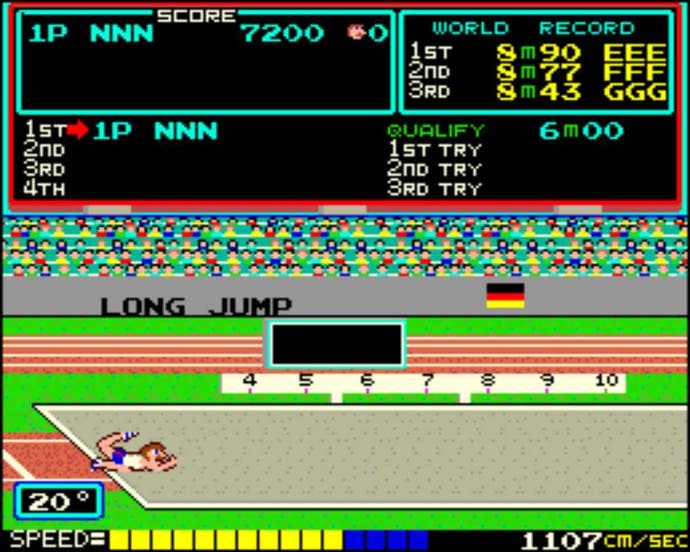Track & Field
Athletic endurance, pre-Wii.
Saliva isn't a particularly common ingredient in videogaming, yet it proved to be a damn-near essential component for some of Track & Field's most successful participants.
Faced with a coin-op control system that invited gamers to repeatedly beat two buttons in order to replicate the exertion of running a 100-metre race, a few resourceful types would use the liquid content of their mouths to lubricate said controls - then slid their hand across them in a manner that boys ordinarily weren't supposed to discover until their early teens. Who says video games lack educational content?
Track & Field was, then, the archetypal coin-op button grinder. An arcade-slanted athletics simulation which aimed to recreate the strenuous participation in six distinct events, using just three buttons. The Olympic-standard disciplines it demanded were the classic mix of brute speed and delicate timing; the former achieved by alternately hitting those aforementioned (hopefully clean) sprint buttons at alarming speeds. Timing, however - particularly with the brutally hard hammer throw - utilised the third button. This needed pressing for the correct duration of time and at the precisely required moment, or it was game over.

The concept behind each of the six events - 100m, 110m hurdles, long jump, high jump, javelin and hammer - was devastatingly simple. The demands of the game were 70% physical and, blended with one of the most competitive multi-player modes ever seen in a videogame, still retain an impressive ability to damage wrists, devastate buttons and joyfully entertain. Speech was used as a fairly integral part of its mechanic, expressing long jump distances (for instance) in a recognisably computerised, yet strangely beguiling, dialect.
Replicated and emulated many times, Track & Field has never been convincingly decamped from the top spot in the genre it helped to create. It's a rare case of getting the gaming mechanic pretty much spot on first time (the comparably unfair hammer event excepted) - leaving imitators and sequels to pretty things up, add new events, but ultimately tip their hats to a bona fide arcade classic.
